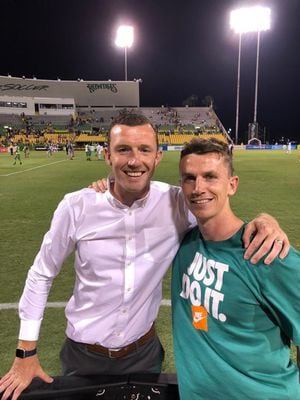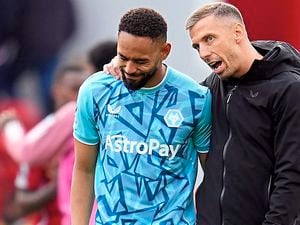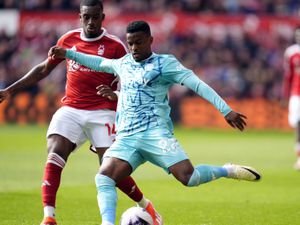Paul Berry: Neill Collins putting the art of timing into practice having learnt from the best
As a powerful and combative defender, Neill Collins prided himself on being in the right place at the right time.
Sliding in to make that crucial last-gasp tackle, or arriving perfectly in the box to score one of the 31 goals he notched from 530 appearances in England and Scotland.
One incident however, demonstrated that Collins’ timing wasn’t always inch perfect.
Picture the scene.
The Wolves team coach, after a midweek away win, waiting to begin a long journey home.
Only one person is missing, the manager, Mick McCarthy.
Spirits are high, the banter is flowing.
The call goes up.
“We’ve had enough, here…the gaffer needs telling.”
And so, a plan is drawn up.
Every 30 seconds, in ascending squad number order, a player on the coach has to shout words along the lines of “Any ****** chance, gaffer” but with another personal insult or two thrown in for good measure.
Furthermore, even when McCarthy has actually boarded the coach, the ‘lucky’ player next on the list still has to deliver the line.
After a few relieved players took their turn, with no sign of McCarthy, he suddenly got on the coach. And the pendulum had swung to Collins.
One thing the affable Scot has never been is a shrinking violet, and so, in full keeping with dressing room etiquette, he fulfilled the task, albeit with team-mates later reporting he was practically hugging the manager in apology by the time he had uttered the final word!
The whole coach goes up, a sign of the team spirit and togetherness which existed at that time, from players through to McCarthy and his staff, not to mention the supporters who took that ‘young and hungry’ team under their wing.
At 36 years of age, Collins has now moved from the back of the bus to the front, from loyal and unshakable player to the man in the hotseat, and is almost two years into the role of Head Coach of Tampa Bay Rowdies in the United Soccer League in America, one below the MLS.
So the balancing act of that player/manager relationship, as perfectly illustrated by that McCarthy episode over a decade ago, is something that now crosses Collins’ desk instead.

“Mick had an incredible amount of respect from the players at that time as well as this great authority,” says Collins, always one of the livelier characters within the changing rooms he frequented as a player.
“But that wasn’t to the point where you couldn’t speak to him or have a laugh with him.
“It was pretty clear where the line was, although that stuff on the team bus probably went pretty close!
“A key thing for a manager is to develop that good team spirit, and I remember on pre-season trips we’d be on the bus after the game and be looking for a night out.
“We’d all text him at the same time: ‘You’re the best boss, can we get let out?’ And he was great at cultivating that spirit and atmosphere.
“I remember a game at Scunthorpe away, the season between the play-offs and winning the league, when we were a bit up and down.
“We were in the huddle, and I remember the talk being that we owed the gaffer a result and a performance, and you don’t hear that from players too often.
“For me, moving from being a player at Tampa Bay to the head coach, I do try to be myself, and that includes having a laugh from time to time.
“When you are laughing it means you are enjoying your job, and at Wolves, I remember we laughed an awful lot.
“But then you always knew when it was time to work, which is the same for me now.
“The best advice I was given in becoming a coach was to be myself, to be my own character, and one thing that the players who have played with me or worked for me know is how competitive I am and how much I want to win.
“People who watched me as a player might think I am going to be ranting and raving all the time but I don’t – I think that approach dissolves pretty fast.”
That competitive Collins’ edge was not just in evidence in matches, and one of his Wolves team-mates Carl Ikeme used to find it strange that after the odd falling-out on the training pitch, the defender would be chatting normally and cracking jokes within seconds of being back in the building at Compton Park.
“Maybe I was unique in having that ability to go from one emotion to the other so quickly,” says Collins.
The former defender has always been one of the game’s thinkers, which perhaps makes his transition from player to dugout a move which was always a possibility.
Perhaps less predictable was the timing, with Collins two years into life as a player in Tampa Bay, and performing well, when opportunity came calling.
“Having come out here as a player, I knew I was wanting to get into coaching, and had already started doing loads of work in the community, coaching kids, high schools and the Men’s Paralympic team,” he explains.
“It was going well, and was growing quickly alongside my playing, and my ultimate ambition was to get an assistant coach or manager’s role at some point in time.
“I was still playing, and playing well, but all of sudden there was a change and the Head Coach position became available.
“The first five months were something else, and our Owner and President have both said they had never seen a set of circumstances like it.
“We had players retiring for a variety of reasons, guys getting serious injuries, other off-field problems, it was one thing after another.
“We managed to come through it, and last year went well and this season had started positively.
“I learned so much in those first few months.
“In an ideal world it would be great to dip your toes in a first team coaching role before taking your first job but by the same token there is no experience like being the one who has to make the big decisions.
“These players were my peers one week, and then the next I was telling them they weren’t in the team, and I quickly had to deal with those situations in the best way possible.
“It was no different to when I started out at Queen’s Park or Dumbarton as a player – it’s about learning, and it’s all-consuming, but that is just how I want it.”
Having steadied the ship in his first and so far only full season at the helm, Collins led the Rowdies to a fifth-placed finish and the play-offs in the 2018 campaign, and the team won this year’s curtain-raiser, 1-0 at New York Red Bull Reserves, before the season was delayed due to the Coronavirus pandemic.
And so, in another one of those managerial challenges that can emerge from nowhere, Collins is currently keeping in touch with squad and staff remotely with the USL having issued a ban on clubs training until at least April 5th and the league on hold until at least May 10th.
That sort of challenge is nothing new for a player born in Troon who landed his first big breakthrough by joining Sunderland in 2004, having featured in a trial game in which then boss McCarthy was particularly impressed by his vocal and organisational prowess.
He was part of the Championship-winning Black Cats squad before linking up with McCarthy again, at Molineux, for a three year spell which included another second tier title in 2008/09.
“The time at Wolves was one of the most enjoyable parts of my career by a long way,” Collins recalls.
“It wasn’t just the football, it was because of the people we had at the club at that time – speak to anyone involved and they will tell you about how the bond across the whole club was so strong.
“We were all part of something that was a bit different, and was very special.
“I was fortunate to be there not long after the start of Mick’s time, and saw players come in like Kights (Michael Kightly), (Andy) Keogh and Michael McIndoe, and we had a great run to the play-offs.
“That maybe raised expectations and set the bar high and the following season we went from finishing fifth to seventh, before coming back and winning the league the year after.
“Mick has to take the credit for building such a great squad with that spirit and togetherness.
“It was very similar to Sunderland with a group of young guys of similar age, without any families as yet, along with a couple of really good experienced players.
“There were so many good characters at Wolves, nice guys but real competitors as well, with a huge desire to improve and get somewhere in their careers.
“There were strong personalities who would fight for each other and training was always super competitive with the likes of Karl Henry heavily involved!
“We were the best of friends, but at times the best of friends can give each other the most honest feedback, and that is how it was.
“As soon as the boys get back together, as we did a few years ago now at Jody Craddock’s testimonial, that togetherness, the banter and camaraderie, it all comes flooding back.
“That season we got promoted is something which everyone who was involved looks back on with immense pride just at being a part of that team.”
Ultimately that Championship-winning season would signal the end of Collins’ spell at Molineux.
An unfortunate own goal and late red card in a 1-0 defeat at Reading proved his final league outing, but he did depart for Preston at the start of the following season with a flourish with his last kick of a ball in Wolves’ colours a decisive penalty in a Carling Cup shootout win against Swindon.
There may have been a spot of frustration in those final few months, and Collins admits he perhaps left the club too soon through an impatience for first team action, but it was all done amicably with McCarthy, as he would have expected.
And the positive memories of life in a Wolves shirt – 97 appearances and ten goals - far outweigh the negative.
Some of those goals were crucial, and one of them lingers particularly in the memory.
A pre-Christmas trip to Doncaster, a late header to convert a Kightly free kick prompting frenzied celebrations in front of the travelling fans, and all in a game in which, summing up Collins’ approach to football and the team spirit at the time, he wasn’t even supposed to have played in.
“Any footballer dreams of scoring an important goal like that in front of your own fans, and the feeling back in the changing room at full time - the buzz - was brilliant,” he says.
“That feeling is what you play the game for.
“The team had been on a good run and I’d been playing and then ‘Mance’ (Michael Mancienne) came in and although he did well, like any player when they are not involved, I wasn’t overly happy.
“I wasn’t due to play at Doncaster, but ‘Mance’ went down with a migraine before the game and Mick told me I was starting.
“Because the team had been doing really well, I knew I had to make sure I hit that standard – I didn’t want to let anyone down.
“When you looked back at the end of that season after we had won the Championship, there were moments like that, goals, or a tackle or a save, which I will always remember.
“And when you think about the whole time at Wolves, you reminisce about so much, not just the games and the big moments but also nights out and other things that went on off the field.
“We spent a lot of time together off the pitch, and everything we went through was a part of the whole experience.
“I know Doc (Matt ) Perry is still at Wolves now and has been for many years.
“He said one of the kindest things to me when I was leaving.
“He thanked me and wished me all the best, and said when I came to the club he felt I really played a huge part in pulling the team together and helping things move forward.
“It was a really nice thing to say and meant a lot, but I think all the boys in that time played their part in turning what was a mid-table Championship team into one which went into the Premier League.”
Collins remains proud to have turned out for so many household names in English football, not just Sunderland and Wolves, but also Leeds and Preston, and Sheffield United, where he enjoyed his longest stay, describing the Blades as a “fantastic club”.
There were further Wolves links during that time, Collins playing alongside Conor Coady at Bramall Lane – “just one of the best guys and to see him doing what he is now is fantastic” – and Kevin McDonald – “a great lad who we didn’t half miss in the 2012 play-off final.”
Collins also studied for his UEFA B Licence qualification on the same course in Scotland as Nuno Espirito Santo, swiftly recollecting his demands for high standards in his coaching as well as a couple of ‘standout’ training sessions.
But the main Molineux link which has stood the test of time has been the friendship with former Wolves team-mate Kevin Foley, now a renewed working relationship as well, with Tampa Bay having appointed Foley to the coaching staff at the start of the USL season.
“Anyone who has worked with Foles and seen him behind the scenes will know exactly why I wanted to bring him in,” says Collins.
“We developed a really good friendship whilst playing at Wolves, but we are very different characters.
“I will often wear my heart on my sleeve, whereas Foles is very straight down the middle, cool, calm and collected, and that is why it works well.
“One thing I saw very quickly with Foles is that he has a very strong and steely determination.
“Anyone who thinks that he is just this young and fresh-faced guy as he was when arriving at Wolves as a player and now here as a coach, would be very much mistaken.
“He is on the same page as me football-wise, is very keen to learn, and is already having a positive impact over here – I think he will go on to enjoy a great coaching career.
“I’m really glad to have had the opportunity to bring him over and hopefully we will be working together for a long time.
“Our families get on really well too, our lads both play in the same junior team, and it’s quite surreal sometimes on a day off that we will head off for the beach.
“I said to Foles we have been doing things on a day off that we would normally have done on a holiday!
“The lifestyle is everything that you would expect it to be, which is great, but we know the coaching and management side is 24-7 so that is where the main focus has to lie.”
If the lifestyle is very different so too is the football, and Collins, whose team-mates included Joe Cole when first moving to the States as a player, admits he has had to adapt since travelling across the pond.
“The dressing room culture is not the same as it is in the UK, and there are things you could say back home to each other that just wouldn’t be acceptable here,” he explains.
“There are a lot of intelligent footballers back in England, but pretty much all the guys here have been to College or University before coming to us.
“They are such an honest group, they are like sponges, always wanting to learn, they have that mindset.
“They love to train - a lot went to college where you play for three months of the year and train for the rest - and so sometimes you just need to remind them that it is the games which are the real judge, where you need to perform.
“As a coach, at the end of the day it is all about how you deal with people.
“Whatever club you are working at, whatever league, there is always the tactical side and getting everyone to play in a certain way.
“But ultimately it is about getting a group of 25 men, and the staff, to go in the same direction when they all have different personalities and all have other things to deal with in life away from football.
“For me, dealing with people and getting the best out of them - that is the key to success.”

What then does the future hold for Collins? What would constitute that success?
That can often feel like a loaded question.
But, such is his relish for the job he currently holds and the privilege and responsibility he feels at being Head Coach of the Rowdies, the present dovetails nicely with the future and a long-term ambition to keep pushing and testing himself should the opportunity arise.
“Right now, this is a great place for me to be, with a really good job, and a young family able to enjoy living here, so I have the best of both worlds,” says Collins.
“I never ever take for granted the position I am in.
“I do believe I have one of the best jobs a young coach could possibly have, and it is different to being a player.
“As a player you might be impatient, because you have such a short window on your career, but as a coach it’s different, and I want to be coaching for the next 30 years.
“There is certainly no rush for me and I’m not lying in bed thinking about where the next opportunity is going to come from, far from it.
“I am not patient about the wait to be successful, but I am patient about knowing that this is a fantastic opportunity, and if I am here for a long time, I am doing something right.
“There is always that ambition – like anyone has – to try and coach at the highest possible level but I know I have a lot of time, and I am delighted with what we are doing here.
“I have only just got started, and if the phone rings in the future it would mean we are going in the right direction, but I am more than happy here and determined to make the most of this opportunity and push the club forward.”
Collins, who has made a positive impact at Tampa Bay and is clearly enjoying every minute, has time very much on his side as his coaching career develops.
And of course, timing is everything, just as it was when Mick McCarthy boarded the Wolves team coach those many years ago…
Paul Berry will be writing features for the Express & Star looking back through Wolves' history





